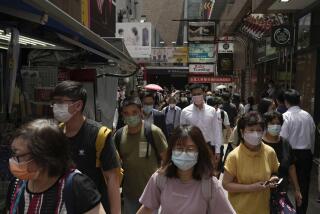Executive Travel: Spotlight on HONG KONG : A Western City-State in the Heart of Asia
For business travelers, Hong Kong is both exotic and familiar. The British crown colony, which will revert to Chinese rule in 1997, is both an ultramodern center of commerce with an exploding economy and a traditional Asian country with Old World ways.
The good news for travelers is that despite the dense population, it is fairly easy to travel and do business in Hong Kong, which is the capital city of the colony.
“It’s a fun city to be in,” said Dwynn Helms, a House of Fabrics buyer in Los Angeles who travels to Hong Kong about twice a year. With stores and showrooms open late and sometimes on weekends, “you can do business seven days a week if you want to.”
Entry requirements: To travel to Hong Kong, you need a passport and proof of return or onward transportation, but you don’t need a visa for stays of 30 days or less. For more information, contact the British Consulate in Los Angeles at (310) 477-3322.
Getting there: Kai Tak Airport, which is on the Kowloon side of the harbor across from Hong Kong Island, is about 20 minutes from the city of Kowloon and 40 minutes from hotels across the harbor.
Clean and fast buses that leave every 15 minutes will get you from the airport to your hotel. Or you can take a cab, which will be more expensive. Cab fare to the Hong Kong side runs about $10; the shuttle costs between $2 and $3, said Winchell Cheung, marketing officer for the Hong Kong Trade and Development Council in Los Angeles.
Getting around: Most travelers find they don’t need to rent a car in Hong Kong because it is a small area with a well-developed public transportation system.
“Besides, traffic can be a problem,” said Albert Chen, general manager of Irvine-based Potrans, who travels frequently in Asia.
One of the easiest ways to get around is underground. “The subway system is very sophisticated, convenient and inexpensive,” Chen said.
“There’s no graffiti and no litter,” Helms said. “You can buy a multi-ride pass and get almost anywhere you need to go, including outlying areas.”
It is also easy to catch a minibus, which seats 10 to 15 people and will stop anywhere you want along its route, Chen said. Taxis are also plentiful and not terribly expensive, because most Hong Kong destinations are close together, he said.
Language: In Hong Kong and Kowloon, English is usually spoken in hotels, Helms said. In the more outlying areas, English becomes less common. If you are traveling to a distant location by subway and will need to get a bus or taxi to your final destination, get instructions written in Chinese to present to the driver before you leave, Helms said. The concierges at most business-class hotels will be able to assist with directions.
Also, before you leave, be able to recognize the name of your destination and the stop where you will get off. Although many people speak English, most signs are not in English, she said.
Tipping: As in many Pacific Rim countries, tipping is not expected in restaurants and cabs, but it is appreciated, Chen said.
Money: You can exchange U.S. dollars for Hong Kong dollars at hotels and private money changers, but banks will provide the best rate. Hotels are convenient, even if the rates are not as good. Always ask about fees in addition to the exchange rate. And be wary of private exchange booths along the roadway, especially if they advertise low fees, because they often make up for it with poor rates, Chen said.
Although traveler’s checks are accepted in many places, using them to make purchases will end up costing you more because of poor exchange rates. It’s better to change them into local currency first.
Safety: As in any dense metropolitan area, you need to be cautious. Because Hong Kong has so many tourists, police and security officers patrol the streets quite heavily, Chen said: “They want people to feel safe.” According to the U.S. State Department Bureau of Consular Affairs in Washington, serious crime is not a problem for most travelers in Hong Kong, but pickpocketing is fairly common.
If your passport is lost or stolen, make sure you report it to both the local police and the U.S. Consulate. If you register at the American Consulate General (26 Garden Road in Hong Kong, (852) 523-9011), you will be able to get continuously updated information on security conditions. For safety information before you go, call the Bureau of Consular Affairs’ automated travel information line at (202) 647-5225.
Business hours: Hong Kong business days start later than those in the United States, Chen said. Most business people don’t start their day until 9:30 or 10 a.m. Lunch is between noon and 1 p.m.
Hotels: Always have a reservation, because hotels fill up quickly. For help with reservations or to check vacancies, contact the Hong Kong Hotel Assn., found at airport counters.
Many of the major Western chains, including Holiday Inn, Ramada, Sheraton, Hilton, Hyatt, Marriott and Radisson, have hotels in either Kowloon or Hong Kong.
More to Read
Sign up for The Wild
We’ll help you find the best places to hike, bike and run, as well as the perfect silent spots for meditation and yoga.
You may occasionally receive promotional content from the Los Angeles Times.






